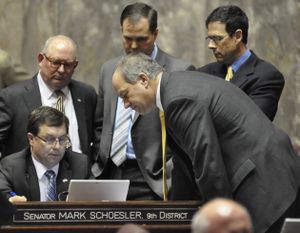Legislature passes budget
OLYMPIA – Washington lawmakers gave final approval Tuesday to a compromise budget that makes incremental changes to programs that could ease problems in mental health, a teacher shortage and homelessness.
A negotiated deal on a net increase of $191 million to the state’s operating budget passed the House 78-17 shortly after noon and the Senate 27-17 shortly before 7 p.m. If all the necessary legislation tied to the budget also pass, lawmakers could adjourn for the year.
The supplemental budget has no general tax increase, although it does call for national broadcasters to pay current and back royalties for programs seen in Washington, a total of $36 million if the state can collect it. It also moves $46 million in marijuana tax revenues into low-income health care and health clinics, and dips into the state’s rainy day fund for $190 million to pay the costs of fighting last year’s wildfires.
It received bipartisan support in both chambers, but strong criticism from both Democrats and Republicans in the Senate.
Sen. Mike Padden objected to a provision that will offer state support of post-secondary education to some prison inmates, changing a policy that only provides it if the inmates pay for it themselves.
“It’s fundamentally unfair to make the victims (of crime) and other middle class families who are paying off student debt to pay for this,” Padden said.
Sen. Brian Dansel, R-Republic, objected to the budget negotiation process that presented lawmakers with a 352-page budget just hours before the vote. “Nobody here, if they were given a test on this budget, would be able to pass it. We would do worse than the kids in schools do on their testing.”
House Democrats started the year saying the Legislature needed to raise taxes to address problems they called emergencies: shortages in teachers and public school classrooms, growing numbers of homeless and better care of mental health patients. Tuesday morning their leaders acknowledged they were only getting small changes in those areas.
A pay raise they proposed for beginning teachers is not in the budget. Instead, there is money for mentorship programs to match young teachers with more experienced colleagues, money for para-educators and a task force to study what base teacher pay should be, House Democratic Leader Pat Sullivan, D-Covington, said.
Proposals to reduce homelessness were also scaled back, and the budget focuses on fighting youth homelessness by getting schools and housing groups to work together to help students stay in housing that keeps them in the same schools. Overall, it’s a “pretty good deal,” House Appropriations Committee Chairman Hans Dunshee, R-Snohomish, said, but added: “It’s not everything you want.”
Rep. Timm Ormsby, D-Spokane, began the floor debate on the budget by calling it good start on state problems. “It makes critical and necessary improvements to what was basically a very good underlying budget,” he said.
Rep. Kevin Parker, R-Spokane, said the adjustments to the state’s two-year budget position Washington for the future. “This is not a time to levy additional taxes on the people,” he said.
But Rep. Jeff Holy, R-Cheney, voted no, and said later he was concerned about the way the proposal pulls money into the state’s general fund from other accounts, spends down the reserves to backfill the costs of fighting last year’s fires, and combines a state pension system for law enforcement and firefighters with an underfunded system for school employees.
“It makes one system more healthy, but it weakens another system,” said Holy.
The state operates on a two-year budget cycle, and the Legislature passed a $38 billion spending plan for most programs and employee salaries last year. This year, lawmakers struggled to make changes to that budget and went into overtime after their 60-day regular session. Tuesday is the 20th day of that special session.
Among the increases in the final budget proposal:
- $32 million for increased employee health benefits
- $28 million for improvements at state mental health hospitals
- $29 million for overtime to home health care providers
- $28 million for added costs for low-income health care
- $18 million for the College Bound scholarship program
- $13 million for a labor agreement with family child care providers
- $11 million to set up a Behavioral Health Innovation Fund
- $8 million to public colleges and universities to cover tuition reductions
- $7 million to recruit and retain public school teachers
- $300,000 for a law enforcement task force in the Spokane area to combat auto theft and other property crimes

